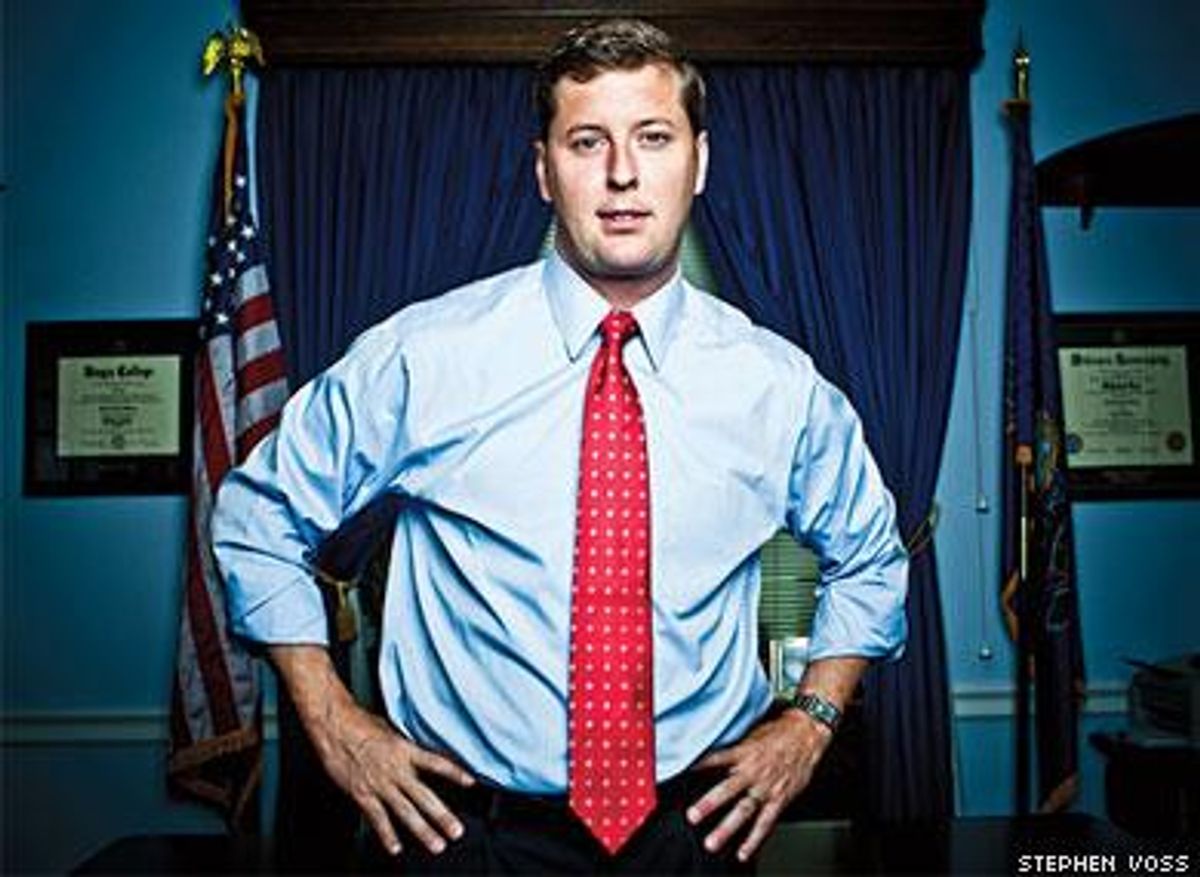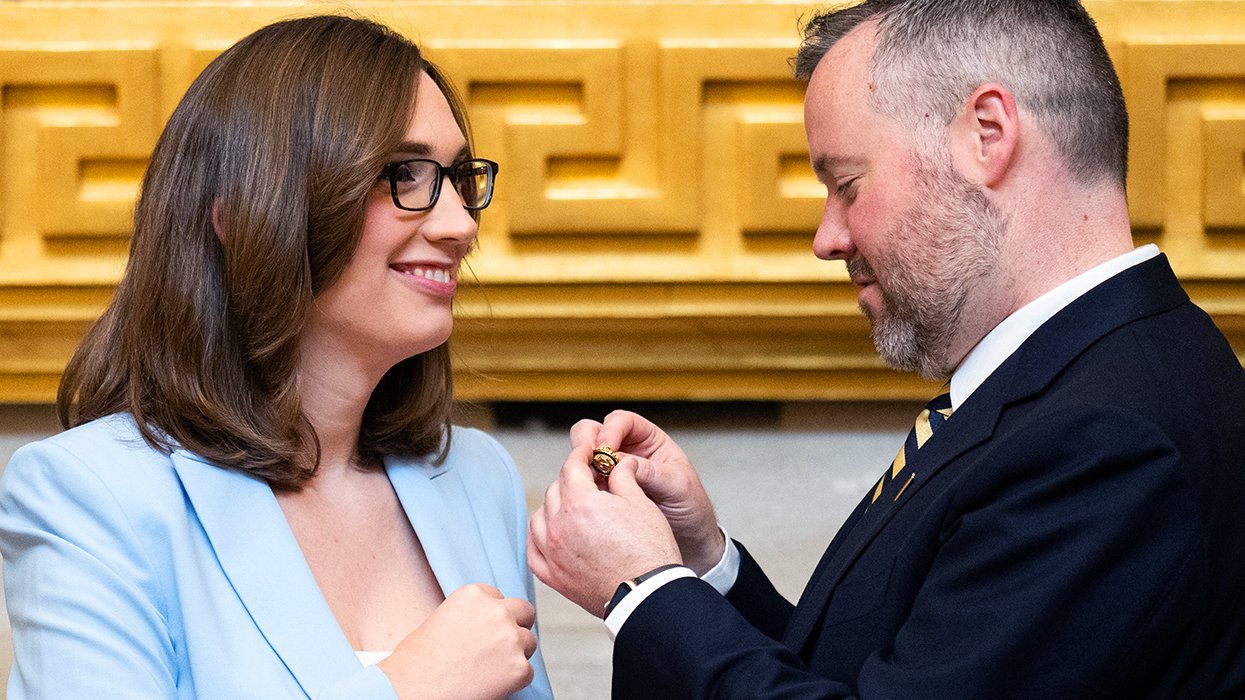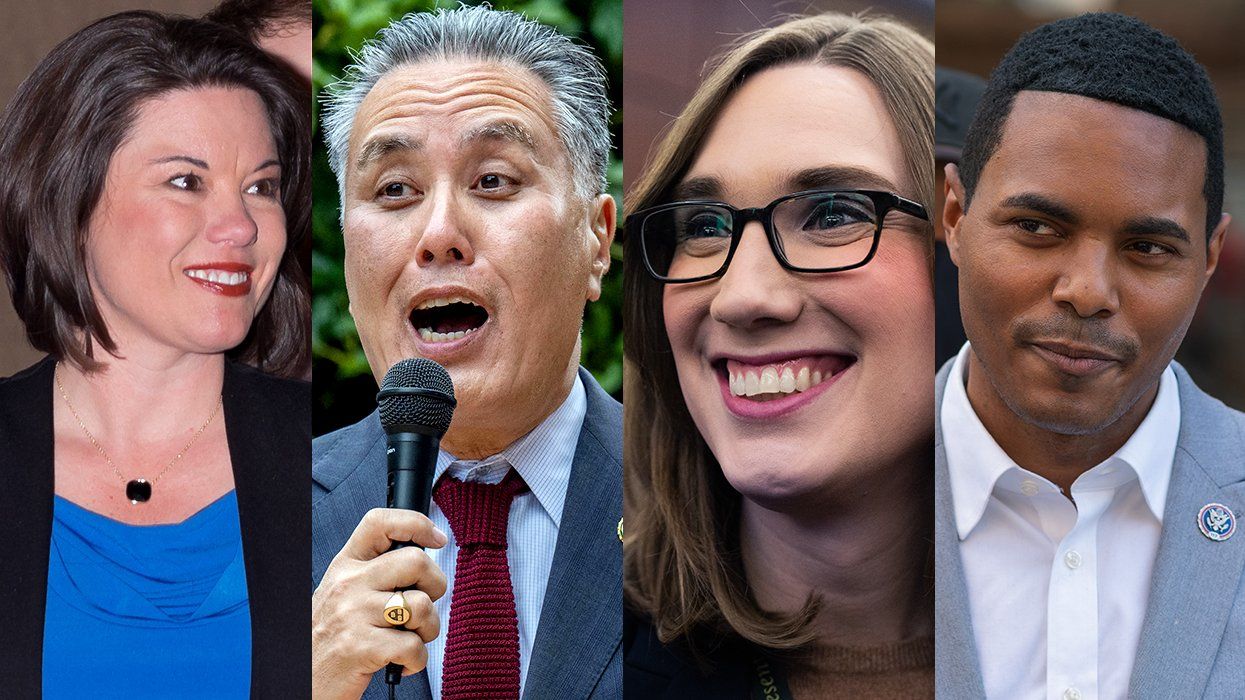
CONTACTStaffCAREER OPPORTUNITIESADVERTISE WITH USPRIVACY POLICYPRIVACY PREFERENCESTERMS OF USELEGAL NOTICE
© 2025 Pride Publishing Inc.
All Rights reserved
All Rights reserved
By continuing to use our site, you agree to our Private Policy and Terms of Use.
Rep. Patrick Murphy plans to offer an amendment to the National Defense Authorization Act Thursday or Friday that would create a mechanism to repeal "don't ask, don't tell" upon completion of a Pentagon study of repeal and certification from military leadership and President Barack Obama.
In the following exclusive interview, Murphy says the compromise has increased the odds of passing the measure, stresses the need to stay focused, but signals his support for an eventual executive order that would prohibit discrimination against gays and lesbians in the military.
The Advocate: Are there any upsides or downsides to the new compromise?
Rep. Patrick Murphy: It's all upside, frankly. I think that it will dismantle "don't ask, don't tell," and it shows great leadership from our military leaders at the Pentagon, the president, as well as those of us in Congress.
As far as logistics, I'm going to introduce my amendment, and I think the arguments against it are pretty weak and outdated. The vast majority of Americans agree that this has hurt our national security to throw out 13,500 troops, it's costing the American taxpayers $1.3 billion, and it's time that we repeal it.
Who drove this process? When and where did you find out about the compromise?
We've been working nonstop. About a year ago I took leadership on this, and we have 192 cosponsors on the bill and other verbal commitments to vote for it -- so we had the votes. We had a setback, obviously, three weeks ago [with the letter from Defense secretary Robert Gates], but paratroopers don't quit. So we worked together with Senator [Joseph] Lieberman, Chairman [Carl] Levin, and the Department of Defense and the president.
I know you were working on language and whipping at the same time, but the final compromise that was relayed in the briefings held Monday at the White House and on Capitol Hill, who was that driven by?
Well, we've been talking to the Pentagon all along. You heard Secretary Gates and Admiral [Michael] Mullen's testimony at the hearing [in February] -- it was never a question of if we would repeal, it was a question of when and how. So we've been working with them, and the amendment language respects the Pentagon's timeline for their implementation study group. When the president signs the Department of Defense authorization bill into law, "don't ask, don't tell" will not be instantly repealed, but only after the study group comes back and the president and chairman of the Joint Chiefs and the Defense secretary all certify that it doesn't hurt military readiness or unit cohesion.
Is the compromise is helping you with your vote count?
Yes.
You've always said you have the votes, but is this giving you extra confidence about passing the measure as an attachment to the defense authorization bill?
Yes. And to be honest with you, when I was in Iraq, paratroopers did not care whether someone was gay or straight -- it was whether or not you could get the job done and make sure that we came home safe.
A number of LGBT people are concerned that there's no
nondiscrimination mandate. Do you share that concern?
Well, I
think this is a smart agreement that dismantles "don't ask, don't tell,"
and we need to act now and with a sense of urgency. And I think this
vehicle helps us get the votes we need to achieve that goal in the
Senate and the House.
I don't think the [Defense secretary] and
Admiral Mullen could be more clear. Admiral Mullen, in his testimony, he
said, "It comes down to integrity. Theirs as individuals and ours as an
institution."
If this passes, a great deal of authority will
go over to the Department of Defense in terms of final repeal and
implementation -- is there any way for Congress to exert some influence
over that process and how long it takes?
I think, first, the
Pentagon has said publicly and privately that they will have that study
group done by December first of this year. And secondly, that they are
of the belief that "don't ask, don't tell" has hurt national security
and the American taxpayer. They agree that we should not be telling
infantry officers or fighter pilots or Arabic linguists that their
services are not needed.
Have you gotten any private
assurances that they will proceed with urgency once the December study
group comes out?
Yes.
From high-level folks at DOD?
Yes.
Have you
had any discussions with the White House regarding timing?
We've
been very clear on the need to get this done. But I think the Department
of Defense has been clear that they think the policy is hurting
military readiness, which is why they came out against "don't ask, don't
tell" and for repeal.
Is there any talk of a possible stop-loss order that would freeze discharges or an executive order
from the President mandating nondiscrimination?
First things first. This is a major
hurdle -- this would be a major event if we could finally repeal "don't
ask, don't tell" after 17 years. So this has been our focus and our
push.
Would you be supportive of the president taking such action
as issuing an executive order prohibiting discrimination against gays and lesbians in the
military?
Yes.
Would you support a stop-loss order?
Yes.
Is
there anything you would like to add, congressman?
I think we're
on the right side of history here, and I've been fighting for folks
like Sgt. Lacye Presley from Florida. Here is an Army medic in Iraq who
won the Bronze Star for literally saving the lives of her fellow soldiers.
And because she saw her commander basically take drugs and sell them,
she reported him, she did the right thing. And yet someone else outed
her because she's a lesbian. Now, Sgt. Presley is an American hero in my
book, and she shouldn't have been hauled into her 1st Sergeant's office
and discharged from our Army. And that's the type of change we're going
to bring about by repealing "don't ask, don't tell."
From our Sponsors
Most Popular
31 Period Films of Lesbians and Bi Women in Love That Will Take You Back
December 09 2024 1:00 PM
18 of the most batsh*t things N.C. Republican governor candidate Mark Robinson has said
October 30 2024 11:06 AM
True
After 20 years, and after tonight, Obama will no longer be the Democrats' top star
August 20 2024 12:28 PM
Trump ally Laura Loomer goes after Lindsey Graham: ‘We all know you’re gay’
September 13 2024 2:28 PM
Melania Trump cashed six-figure check to speak to gay Republicans at Mar-a-Lago
August 16 2024 5:57 PM
Latest Stories
Hard family conversations spanned decades until change arrived at the 11th hour
January 02 2025 8:00 PM
How these trans youth found hope on the Out100 red carpet
January 02 2025 6:37 PM
Republican Steve Scalise bizarrely blames 'DEI' and 'wokeness' for New Orleans terror attack
January 02 2025 5:18 PM
China is arresting writers for posting fanfiction and gay erotica
January 02 2025 3:49 PM
Looking to move abroad? Here are 10 countries LGBTQ+ people could consider
January 02 2025 3:39 PM
20 LGBTQ+ shows to watch while Apple TV+ is free this weekend
January 02 2025 12:39 PM
A camp for kids living with HIV is for sale. Here's why its founder is celebrating
January 02 2025 12:21 PM
Indiana Republicans target transgender people in one of new year’s first anti-LGBTQ+ bills
January 02 2025 11:35 AM

















































































